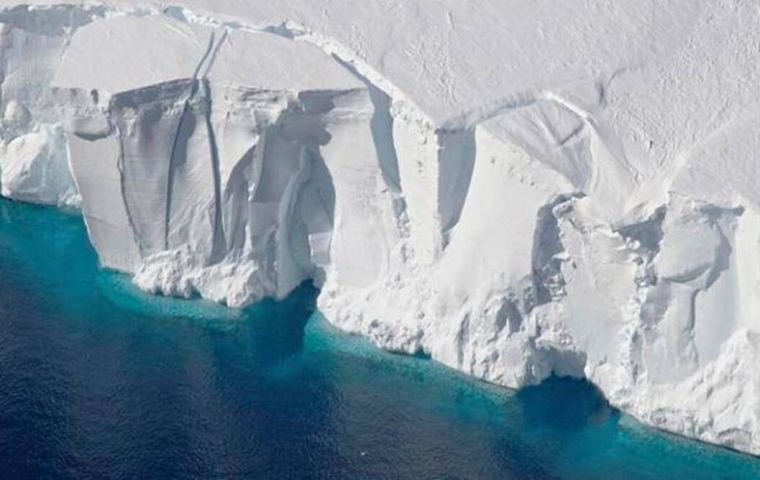MercoPress. South Atlantic News Agency
Antarctica and the “Glasgow Glacier”, a symbol of why COP26 must deliver
 Chain of fast-flowing Antarctic glaciers named for important climate meetings including Glasgow, Geneva, Paris and Berlin
Chain of fast-flowing Antarctic glaciers named for important climate meetings including Glasgow, Geneva, Paris and Berlin While the world gathers in Glasgow over the next fortnight to make progress on tackling climate change, 10,000 miles away the city’s namesake will provide a stark reminder of why urgent action is needed.
An enormous body of ice in Antarctica has been formally named the ‘Glasgow Glacier’ by researchers at the University of Leeds to mark the COP26 Summit.
PhD researcher Heather Selley identified 14 glaciers in the Getz basin of West Antarctica that sped up by an average of 25% between 1994 and 2018 due to climate change. Her study, published in February, found that 315 gigatons of ice has been lost from the region over the last 25 years, adding the equivalent of 126 million Olympic-sized swimming pools of water to the world’s oceans.
Scientists Heather Selley and Dr Anna Hogg requested that the nine unnamed glaciers in her study be named for the locations of major climate treaties, reports and conferences, the most recent of which is Glasgow. Her proposal was submitted by the UK Government and supported by the UK Antarctic Place-names committee. The names will now be added to the international Composite Gazetteer for Antarctica, for use on maps, charts and future publications.
At the G20 the Prime Minister will tell world leaders that time is running out to save civilization from catastrophic climate change.
As the foremost gathering of the world’s largest economies – who between them account for 75% of global emissions – the G20 has a unique ability and responsibility to prevent climate change. There has been progress in recent weeks, but barely half of G20 countries have set out more ambitious plans for cutting carbon emissions since 2015 and there are still two G20 members who have not committed to net zero.
“By naming this glittering giant of nature after the city where humankind will gather to fight for the future of the planet, we have a stark reminder of what we are working to preserve.
”Glasgow represents our best chance. Just as the G20 shares a collective responsibility to act, so the solutions are in our hands. I hope countries will gather this week in a spirit of responsibility and ambition so we can keep the goal of 1.5 degrees alive”.
The Prime Minister is expected to tell about UK’s experience which shows how countries can continue to grow while cutting carbon emissions. He will point out that fifty years ago the UK derived around 80% of UK electricity from burning coal, nine years ago that number was nearly 40% and today it is below 2%. The UK will phase out the use of coal in power generation completely by 2024.
The UK is calling on the world’s richest economies to do everything they can to reach Net Zero carbon emissions domestically by 2050, while helping developing countries transition to clean energy, and halting and reversing deforestation and land degradation by 2030.
Dramatic changes in ice cover and images of Antarctica have become synonymous with climate change. Over the past 40 years, satellites have observed huge iceberg calving events, changes in the flow of glaciers and rapidly thinning ice demonstrating the devastating impact of global warming.




Top Comments
Disclaimer & comment rulesCommenting for this story is now closed.
If you have a Facebook account, become a fan and comment on our Facebook Page!